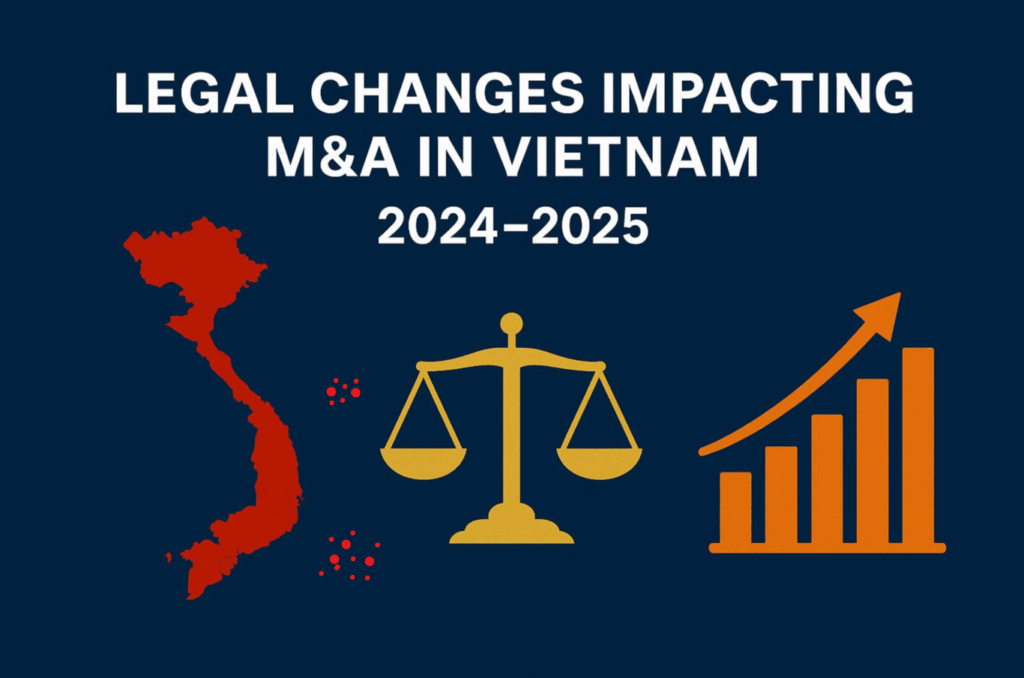The environment of M&A in Vietnam is undergoing a pivotal transformation driven by a wave of legal reforms, sectoral liberalization, and administrative restructuring. These developments reflect the country’s strategic push to attract high-quality foreign investment and modernize its legal and institutional frameworks. For both foreign and domestic stakeholders, understanding these changes is critical to seizing opportunities and mitigating risks in the new M&A landscape. The following article by ASL LAW offers a comprehensive overview of recent legal developments affecting M&A activities in Vietnam, enabling investors to proactively seize opportunities amid rapidly evolving regulations.
1. Vietnam M&A Legal Update: Key Regulatory Changes from 2023 to 2025
A series of regulatory updates introduced since 2023 has significantly reshaped the conditions under which mergers and acquisitions take place in Vietnam.
Enhanced Merger Control Under Competition Law
The establishment of the Vietnam Competition Commission (VCC) in April 2023 under Decree 03/2023 marks a shift towards a more substantive and effects-based antitrust framework. The new regime replaces the previous form-based thresholds with competition impact assessments and introduces a two-phase review process. Transactions that are pre-cleared or fall within safe harbors may benefit from automatic approvals, but companies must be prepared for extended scrutiny if competitive concerns arise.
Investment Law Amendments and Sectoral Liberalization
The newly enacted Law No. 57/2024/QH15, effective from January 2025, amends the Investment Law by removing certain sensitive sectors (e.g., national treasures) from oversea investment eligibility. At the same time, conditional business sectors, particularly in healthcare and high-tech, are seeing simplified entry conditions—offering foreign investors a broader and more accessible landscape.
Land and Real Estate Reforms
With the revised Land Law taking effect in August 2024, the definition of “foreign-invested entities” (FIEs) is narrowed to those holding over 50% foreign ownership. This change allows minority foreign investors to enjoy land-use rights similar to domestic entities, easing real estate transfer processes and expanding deal structuring options.
Banking and Finance Sector Modernization
Decree 69/2025/ND-CP, effective May 2025, raises the foreign ownership cap in distressed private banks from 30% to 49%, unlocking capital injection pathways in restructuring deals. Concurrently, Circular 3/2025/SBV tightens the regulatory framework for Indirect Investment Accounts (IIAs), limiting use cases and requiring clearer transaction reporting, which will impact cross-border capital flows in M&A financing.
Administrative and Macro-Level Restructuring
Ongoing governmental restructuring—such as mergers of provincial units and ministries—aims to improve procedural efficiency in the long run. However, these changes may temporarily slow down deal approvals. Meanwhile, the planned establishment of international financial centers in Ho Chi Minh City and Danang (pending approval in June 2025) signals a commitment to deeper capital market integration and greater investor incentives through tax, foreign exchange, and regulatory benefits.
2. Vietnam M&A Legal Update: Strategic Insights and Considerations for Market Players

As Vietnam’s M&A legal landscape continues to evolve swiftly and extensively, stakeholders must adapt their strategies to stay ahead—capitalizing on advantages while minimizing risks arising from sudden changes in procedures, conditions, and regulatory policies.
Compliance and Competitive Risk Management
Firms must align closely with the VCC’s evolving merger control requirements, including the likelihood of Phase 2 reviews and potential antitrust remedies. Performing early-stage competition analysis under the effects-based approach is essential to avoid delays or rejection.
Structuring Deals with Land and FDI Optimization
Strategic structuring—particularly keeping foreign ownership below 50%—can allow investors to retain domestic classification and enjoy broader land rights. The streamlined real estate transfer rules also make asset-based acquisitions more attractive and feasible.
Banking, Currency, and Capital Controls
Investors involved in banking and financial services should structure deals to take advantage of the raised foreign ownership thresholds under Decree 69. Setting up IIAs under the new Circular 3 requirements demands clear internal controls, labeling, and a single-account structure, which may require adjustments in capital flow planning.
Navigating Sectoral Restrictions
Companies must stay updated on which sectors are opening (e.g., healthcare, digital services) versus those excluded from FDI (e.g., heritage assets). This allows better targeting of investment strategies and avoids wasted effort in restricted sectors.
Anticipating Bureaucratic Delays
Given the ongoing reorganization of administrative units, firms should factor in longer processing times—especially for licensing and merger approvals—and engage proactively with local authorities for updated guidance.
Exploring Financial Center Incentives
Forward-looking companies may explore structuring deals around the upcoming international financial centers, which could offer enhanced liquidity, tax efficiency, and access to more flexible financial instruments post-legislation.
Localized Expertise and Regulatory Monitoring
Continuous collaboration with local legal advisors and proactive tracking of regulatory developments—from VCC decisions to SBV circulars and Investment Law amendments—will be critical to maintaining compliance and seizing first-mover advantages.
Seizing Momentum in a Reform-Driven Market
| Notable Changes | Active Preparation |
|---|---|
| Effects-based test, multi-stage review | Pre-notify with full impact assessment |
| New prohibited businesses, sector simplification | Check restricted lists, leverage open sectors |
| Refined FIE definition, direct rights transfer | Structure ownership thoughtfully |
| 49% foreign limit post-distress mergers | Use Decree 69 for capital injections |
| Single-use accounts, transaction labelling | Set up compliant IIA accounts |
| Delayed approvals, long-term efficiency | Start early, engage local authorities |
| Forthcoming FX & capital liberalization | Prepare to tap into new financial zones |
Vietnam is boldly repositioning itself as a sophisticated and rules-based investment destination. Legal reforms in competition, investment, real estate, and finance signal a clear commitment to enabling higher-quality M&A activity—especially in strategic sectors like healthcare, technology, and banking.
However, this transformation demands that M&A practitioners become more agile and better informed. Success will depend on a deep understanding of the legal terrain, an adaptive deal-making approach, and early-stage risk assessments. By staying proactive and localizing execution strategies, investors can unlock the full potential of Vietnam’s rapidly evolving M&A landscape.
To succeed in a volatile market, businesses must closely monitor legal updates on M&A in Vietnam and realign their strategies accordingly. ASL LAW is committed to guiding clients through every legal transition with deep expertise and forward-thinking solutions.
ASL Law is a leading full-service and independent Vietnamese law firm made up of experienced and talented lawyers. ASL Law is ranked as the top tier Law Firm in Vietnam by Legal500, Asia Law, WTR, and Asia Business Law Journal. Based in both Hanoi and Ho Chi Minh City in Vietnam, the firm’s main purpose is to provide the most practical, efficient and lawful advice to its domestic and international clients. If we can be of assistance, please email to [email protected].
ASL LAW is the top tier M&A law firm in Vietnam. If you need any advice, please contact us for further information or collaboration.

 Tiếng Việt
Tiếng Việt 中文 (中国)
中文 (中国) 日本語
日本語

